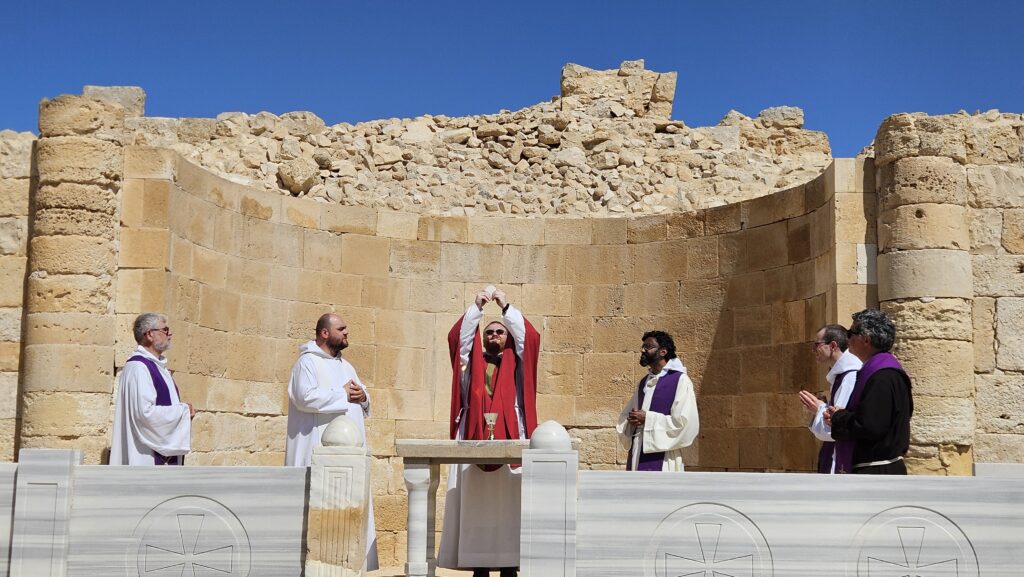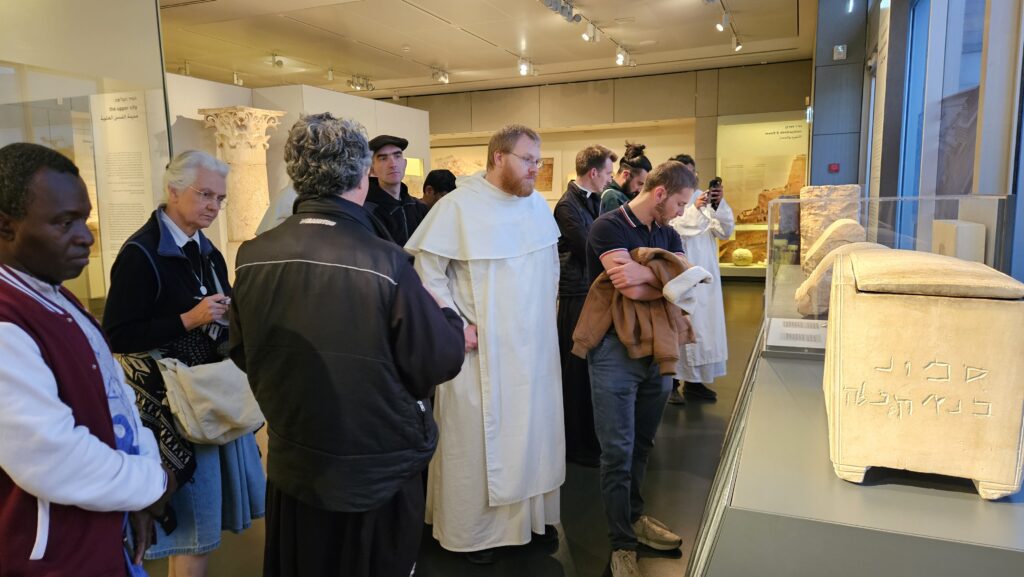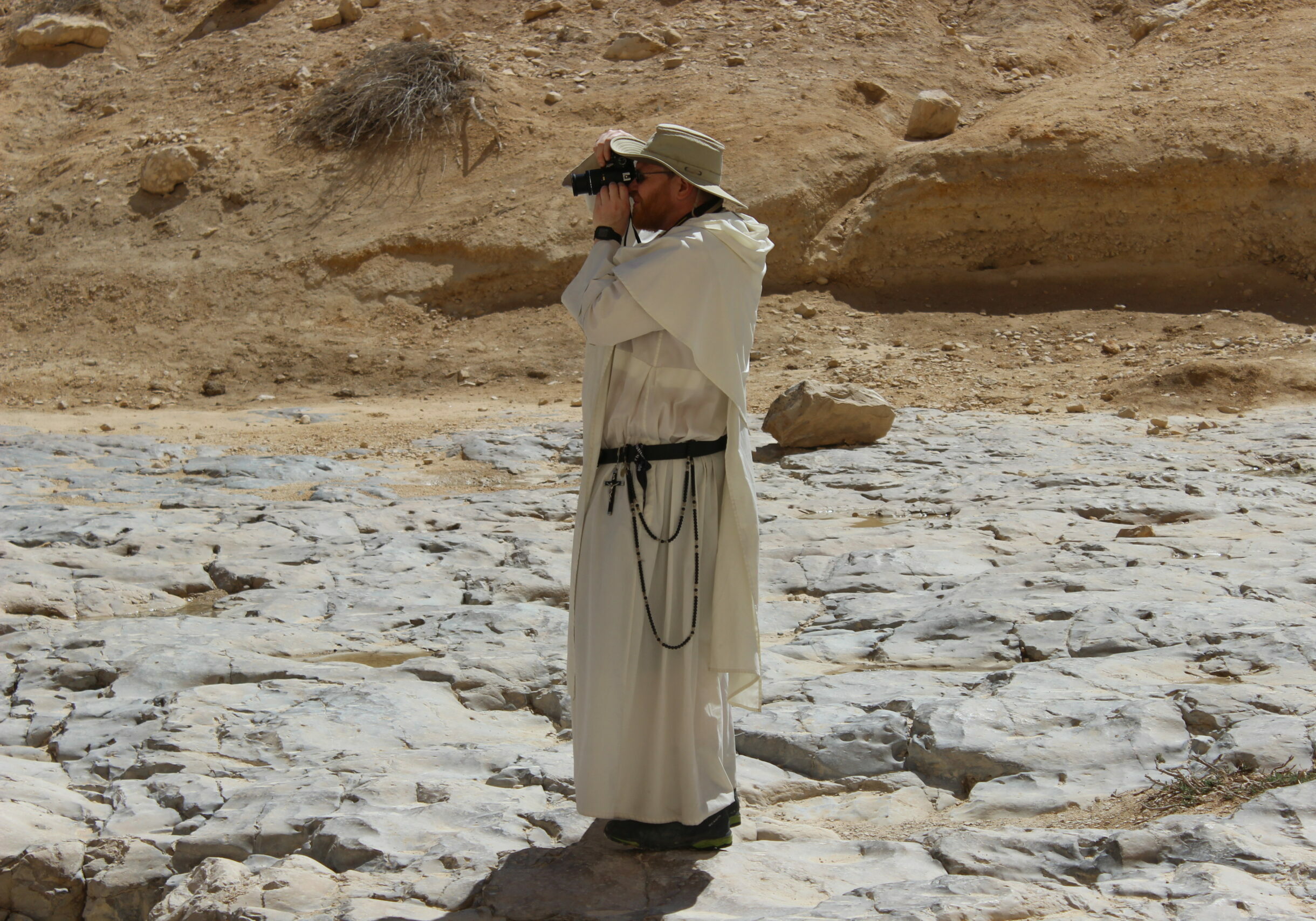Who are you Fr. Leo?
My name is Fr. Leo Checkai, from the Eastern Dominican Province of Saint Joseph in the United States. I’m a doctoral student at the École biblique et archéologique française. I taught at the undergraduate level in the United States for three years, before my superior sent me to study in the Pontifical Program in Sacred Scriptures, which is long and intense as it takes many years to complete. They wanted to make sure that I would enjoy teaching as much as I thought I would, and perhaps they also wanted some work from me after many years as a student. So they sent me to our school in Providence College. I was in the theology department, most frequently teaching in introductory class the New Testament, foundations of theology and other classes as well. I taught Introduction to the thought of St Thomas Aquinas, and a course called Development of Western civilisation, an interdisciplinary program including theology, philosophy, history and literature.
Why did you come to the ÉBAF?
The ÉBAF is a school that I was very attracted to because of the combination of very high level scientific study and the sense of piety. Here, I’m writing on the Vetus Latina, the old Latin, pre-vulgate version of the Letter to the Hebrews. I will teach what I learned wherever the Order sends me. It could be in one of our institutions in the U.S or perhaps in another country.
What did you discover by coming to the ÉBAF?
The visits to the biblical sites in the Holy Land is the new part. Now, when I read the Bible I say “Oh that place I’ve seen!” and it changes the way one reads. Other students’ observations have brought to my mind what I perhaps take for granted about the Dominican schools: they say it is very impressive to them. They see the friars engaged in very scientific criticism of the Scriptures and then immediately go to the chapel and pray the liturgy of those same Scriptures. That is an experience they have not had frequently at other institutions. Just seems normal to me, that is what Dominican school is like. It is the sort of thing I knew in the United States except the Dominican houses of studies, Pontifical faculty of the Immaculate Conception in Washington, D.C, and it is the spirit of Père Lagrange that I read about that I find here.
 Photo: ÉBAF, Ordo Prædicatorum. Divine mass presided by Fr. Leo in the Negev desert.
Photo: ÉBAF, Ordo Prædicatorum. Divine mass presided by Fr. Leo in the Negev desert.
What are the strengths of the ÉBAF in your opinion?
I find the friars’ commitment to the intellectual life, their cultivation of high level research very interesting and attractive. The school has a certain flexibility that I might not have found at larger institutions. When I arrived here, I thought I was going to do a doctorate on one thing, and as I worked through the program I found another topic that was actually much better for me. Perhaps in schools where everything is planned out and subjected to a strict progression of steps I might have been not able to change, but here I was able to have discussion with the faculty and change my course to a dissertation topic that is very excellent for me. I love the Latin and Greek traditions of the Scriptures as well as Hebrew, and I love to see how Latin and Greek interact and relate to each other, and that is what I do in the study of the old Latin; you can’t study the old Latin well apart from the Greek. Everything I do is looking at how the Latin texts relate to the Greek Scriptures.
How do you articulate reason and faith?
Like Dominicans in general, I have a great confidence that God is the author of all truth, supernatural and natural alike. Even though I might not really see right away, certain supernatural truth might fit with natural findings. Because of that confidence I have no fear at all about following up natural science methodologies according to their own rules because I’m sure that eventually we’ll see how they all fit together in one big picture.
What does Holy Land mean to you?
In the life and the thought of the church we have the idea of the sacramental, even beyond the seven sacraments themselves. We have the idea of things that are related to God and holy things or people able to be channels of grace. By the very fact of our lord’s incarnation living here in this land, by God’s actions in history with his people in the living ark of his covenant, there’s a certain sanctification of the land whereby we call it the holy land. I’ve read that even since the writings of the Church fathers, some people have scoffed and said “It will be the Holy Land when people stop killing each other.” It is a place of people who specialise in killing each other. None of our sins or sinfulness can take away the power of God’s grace to work in us, on us, through us, and even though the events of the Bible are distant from our same time, there is still something especially holy about being able to be in and to see the places where those things happened.
 Photo: ÉBAF, Ordo Prædicatorum. Topography class in the Israel Museum, Jerusalem.
Photo: ÉBAF, Ordo Prædicatorum. Topography class in the Israel Museum, Jerusalem.
How does your stay in Jerusalem influence your Christian life?
As soon as I came here I saw very quickly and I continue to see that Jerusalem is a place where people might have different ideas about how God ought to be worshipped. Even though tempers can get heated sometimes at each other, most of the time what I see is a great respect for people who are also sincere about the worship of God, even if they have different ideas about how it ought to be done. I found that inspiring! It motivates me to go deeper into my own faith and worship God more fervently myself.
What would you say to someone interested in studying at the ÉBAF?
It’s a wonderful opportunity, and make sure that you know your biblical languages very well and don’t wait to come here to learn some French! Expect to learn a lot both inside and outside the classroom.
What would you say to the donors of the ÉBAF?
Thank you very much. We can’t do what we do without you. That’s what it means to be a mendicant order. We do study as our work and that does not produce money in itself. If you value our learning and preaching, please keep on supporting us. We will pray for you.

